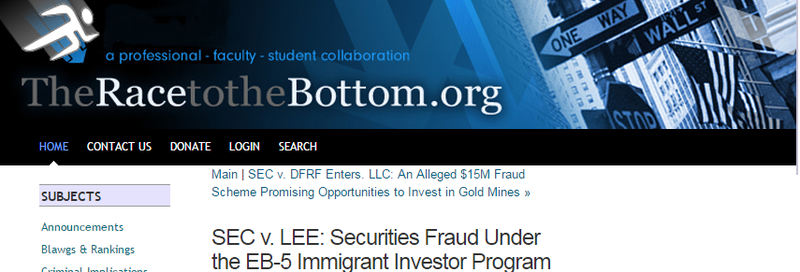SEC v. LEE: Securities Fraud Under the EB-5 Immigrant Investor Program
The United States Citizenship and Immigration Service (“USCIS”) administers the EB-5 visa program for immigrant investors seeking permanent residency in the United States. To receive permanent residency, immigrant investors must invest at least $500,000 in a Target Employment Area (“TEA”) and created 10 full-time jobs for United Stated workers. This program allows investors to designate entities as “regional centers” inside a TEA. In 2006, Lee applied to designate one of the Entity Defendants as a regional center. The Entity Defendants raised $11,455,000 in investment contracts from immigrant investors for the construction of an ethanol plant.
The SEC filed a complaint against defendants, claiming the Defendants violated Section 17(a) of the Securities Act, Section 10(b) of the Exchange Act, and Rule 10-5b. The complaint alleged the Entity Defendants never constructed the plant, and used a majority of the money raised by the immigrant investors for other purposes.
Together, Section 17(a) of the Securities Act, Section 10(b) of the Exchange Act, and Rule 10-5b prohibit fraud in the offer or sale, or in connection with the purchase or sale of securities. For the SEC to prevail, it had to show: (1) the Defendants made material misrepresentations and omissions; and (3) those statements and omissions were made with scienter.
The complaint alleged Lee misrepresented to investors that major construction on the plant was ongoing, Lee submitted forms with false information to the USCIS, Lee paid off investors in other schemes with the immigrant investor money, and the Entity Defendants were purposed for other tasks. First, the court held the Defendants made material misrepresentations to its investors. The court reasoned that, contrary to the Defendant’s representations to investors, investors’ money did not go towards the plant, was not helping the investors gain permanent residency, and did not create jobs in relation to the project. Because the court found there was a substantial likelihood that a reasonable investor would consider this information before investing in the plant, it held the Defendant’s misrepresentations were material.
Next, the court turned to the element of scienter to determine if these misrepresentations were committed knowingly or recklessly. Scienter is satisfied by proving recklessness. The court determined the facts supported a claim that Defendants made the misrepresentations with the requisite scienter: (1) Lee headed and controlled each of the Entity Defendants; (2) Lee signed the regional center applications; (3) Lee represented to both investors and the USCIS that the plant would be constructed, even when construction was no longer feasible; (4) Lee provided offering materials to investors; and (5) Lee approved all information regarding the plant in numerous investor seminars.
The court enjoined the Defendants from violating Section 17(a) of the Securities Act, Section 10(b) of the Exchange Act, and Rule 10-5b, ordered Lee to pay a maximum civil penalty of $150,000, and ordered disgorgement of $8,262,403.73 – the approximate amount of immigrant investor money the Defendants misused, after an adjustment for inflation.
The primary materials for this case may be found on the DU Corporate Governance website.
Mentions
Litigation Cases
States
- California
Videos





Subscribe for News
Site Digest
Join Professionals on EB5Projects.com →
Securities Disclaimer
This website is for informational purposes only and does not constitute an offer or solicitation to sell shares or securities. Any such offer or solicitation will be made only by means of an investment's confidential Offering Memorandum and in accordance with the terms of all applicable securities and other laws. This website does not constitute or form part of, and should not be construed as, any offer for sale or subscription of, or any invitation to offer to buy or subscribe for, any securities, nor should it or any part of it form the basis of, or be relied on in any connection with, any contract or commitment whatsoever. EB5Projects.com LLC and its affiliates expressly disclaim any and all responsibility for any direct or consequential loss or damage of any kind whatsoever arising directly or indirectly from: (i) reliance on any information contained in the website, (ii) any error, omission or inaccuracy in any such information or (iii) any action resulting therefrom.



